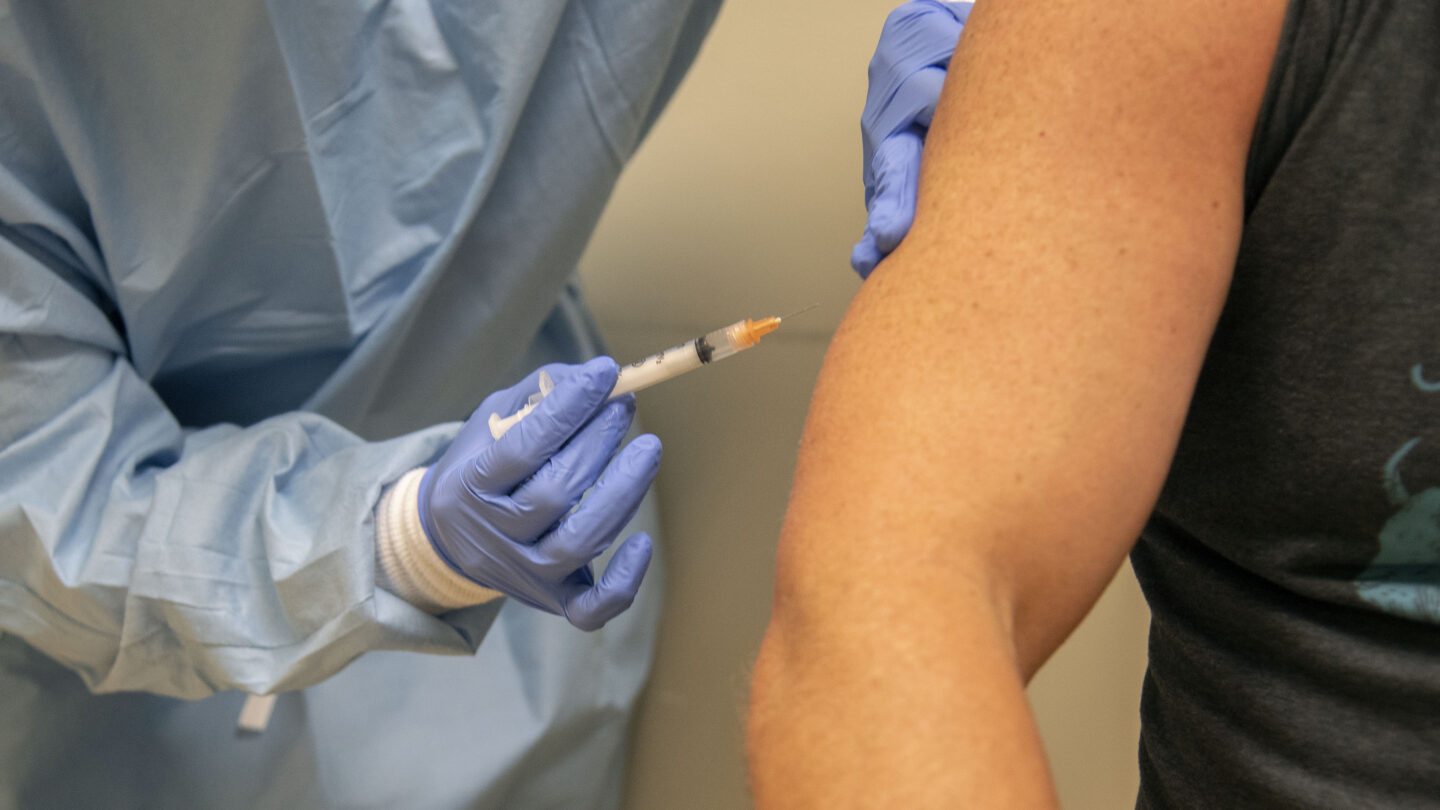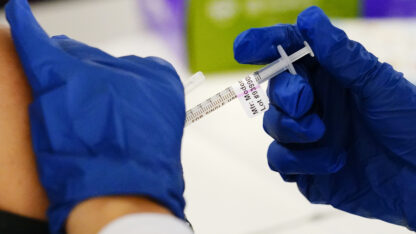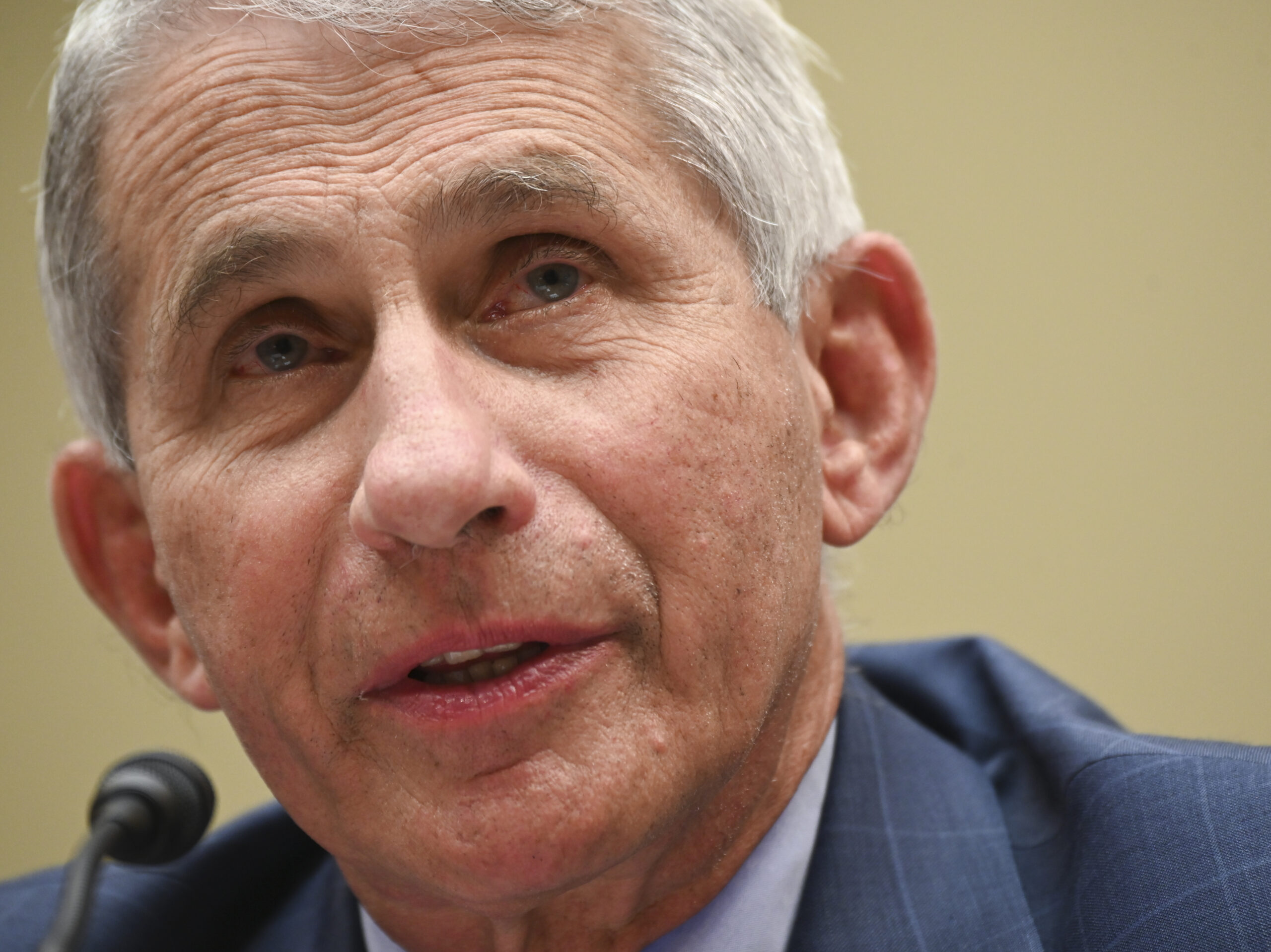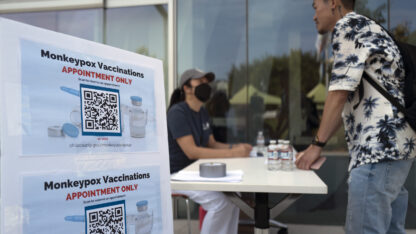Monkeypox vaccine shortage persists as major events loom in Atlanta
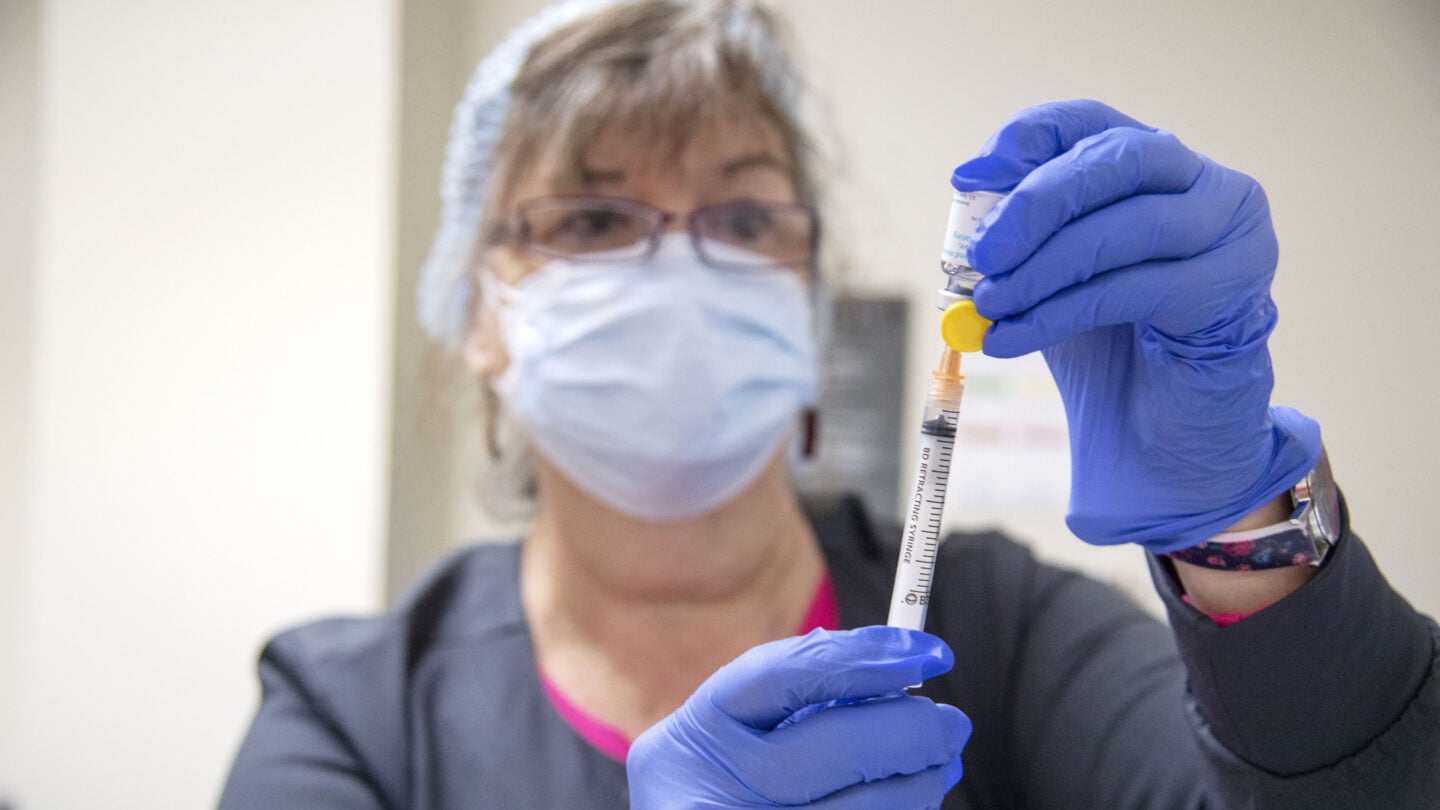
Two months after the first monkeypox case was confirmed in Georgia, the state has emerged as a hotspot for the disease, with the fifth-highest number of infections in the nation.
But a shortage in the number of vaccines available has led those most affected in the current outbreak — gay and bisexual men — to go on a frantic and often fruitless search for the shot. That combined with a lack of information about and availability of testing and treatment has brought up painful memories for a community scarred by past public health failures.
Gay Atlanta resident Ralph Mays started checking with local county health departments, health clinics and nonprofits for a monkeypox vaccine several weeks ago.
“The appointments ran out within minutes of being posted online,” he said.
“I’ve definitely heard from dozens of people with similar experiences,” he added.
Local county health departments have been periodically posting dates and times where a link goes live with new appointments, but their websites often crash as vaccine seekers flood the page and hundreds of slots get filled up within minutes.
Meanwhile, Mays and others continue to look for the shots as officials on the local, state and federal levels play catchup to try and contain the spread of an often misunderstood disease.
And the outbreak is — so far — disproportionately affecting Black gay and bisexual men in particular, as the world’s largest Black Pride event comes to Atlanta in a few weeks.
Underordered vaccines and delayed declarations
The first monkeypox case of the current outbreak was confirmed in the United Kingdom on May 6. The Atlanta-based U.S. Centers for Disease Control and Prevention confirmed the first monkeypox case in the U.S. — in Massachusetts — on May 17. The Georgia Department of Public Health confirmed the first monkeypox case of the 2022 outbreak in the state on June 6.
But as of July 22, the state of Georgia had requested less than half of its Phase 1 and 2 allotments of nearly 14,000 JYNNEOS vaccine doses from the Strategic National Stockpile, according to the U.S. Department of Health & Human Services. Every other state with the top 10 highest number of cases besides Georgia had requested more than 100% of their allotment by that point.
By then, the mostly gay and bisexual men that the outbreak was affecting were already searching county health departments and nonprofits across metro Atlanta for the vaccine and coming up empty.
Nancy Nydam, a spokesperson for the Georgia Department of Public Health, told WABE that they didn’t request the full allotment earlier because they wanted to stagger the shipments to local providers, who Nydam said have limited storage for the vaccine. GDPH had requested their full allotment from the national stockpile as of July 27, Nydam added.
Compounding the problem was a shortage of available monkeypox vaccines on the federal level, an issue many public health experts have pinned on the Biden administration. The shortage was caused in part by the Department of Health and Human Services’ delay in asking that bulk stocks of vaccine it already owned be bottled for distribution, according to administration officials who spoke to the New York Times.
The Biden administration declared the monkeypox outbreak a public health emergency on Aug. 4, which the head of the National Coalition of STD Directors called “long overdue.” The World Health Organization issued a similar declaration nearly two weeks earlier. The declaration unlocks additional funding and flexibility and raises awareness about the issue.
“For nearly three months, STI clinics have been alone on the front lines of this outbreak, fighting a battle to keep their communities safe without the necessary resources to adequately treat their patients, prevent further infection or enough access vaccines,” NCSD Executive Director David Harvey said in a statement. “HHS’s declaration of a public health emergency is the right thing to do and we applaud their actions. It’s about time.”
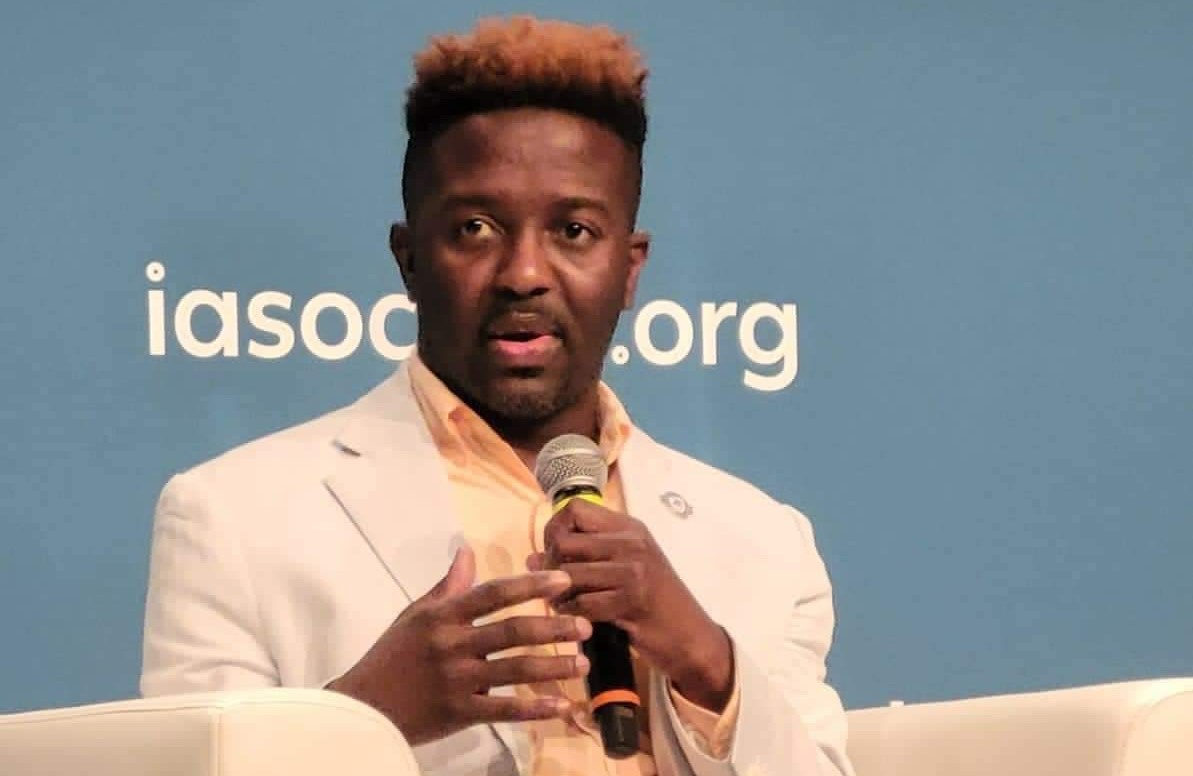
Racial disparity worries event organizer, public health experts
Every Labor Day Weekend, tens of thousands of people from across the world descend on Atlanta for Atlanta Black Pride. Attendees can be found at a festival in Piedmont Park, workshops and parties throughout the city that weekend.
But the disproportionate impact of the monkeypox outbreak on Black gay and bisexual men has Atlanta Black Pride organizer Tyai Green “extremely concerned.” There are 775 reported cases of monkeypox in Georgia as of Aug. 10, according to GDPH. Nearly all of those cases are gay and bisexual men, and over 80% are Black.
“We are the largest Black Pride in the world, and that could get majorly out of hand for the Black LGBT community,” Green said of the outbreak. “If they don’t have the proper knowledge and take the proper precautions, there could be catastrophic damage.”
Green said that up until early August, there hadn’t been enough outreach from the CDC and the Georgia Department of Public Health to local Black gay and bisexual men about testing, treatment and a vaccine. But it’s picked up since then.
“What we’ve found is information is key to prevention,” he said. “We don’t want a repeat of COVID.”
Daniel Driffin is a public health doctoral candidate at Georgia State University and co-founder of THRIVE SS, an Atlanta nonprofit that works to achieve health equity for Black gay men living with HIV. He said the demographics of the monkeypox outbreak expose the racial inequities present in health care.
“It is a travesty and crime that more than 80% of the affected are Black,” he said. “With Black Gay Pride approaching Atlanta, local boards of health, [the] Department of Public Health, community organizations and Black Pride vendors should be convening right now to implement pop-up viral testing for monkeypox, COVID-19, HIV and hepatitis C. Similar efforts are needed for vaccination sites.”
“We can do better, we must do better,” he added.
While monkeypox is rarely fatal, Ralph Mays said that the outbreak, the most affected population and the government response bring up memories of the early days of a different infection.
“For LGBTQ people, our community’s collective reaction to this moment has to be colored by the memory of an entire generation that was lost to government inactions in the face of the AIDS public health crisis that disproportionately affected gay and bisexual men,” he said. “So, this is certainly something that holds additional weight for us.”

More doses on the way to Georgia
The Georgia Department of Public Health has received and distributed the full Phase 1 and 2 allocations of nearly 14,000 doses of the JYNNEOS vaccine, according to Nydam. But it’s a two-dose vaccine (given four weeks apart), so that will only cover about 7,000 people.
The Phase 3 allocation is about 34,000 doses and will be available over the next four to six weeks. But the Department of Health and Human Services allowed GDPH to order only up to 40% of that allocation — or about 13,600 doses — right away, according to Nydam. Those doses have been received and are being distributed to health departments and community-based organizations statewide.
GDPH will be allowed to order about another 10,000 doses this week. They recommend that people most at risk of the disease contact their local health department for information about testing and vaccine availability.
The governors of New York, California and Illinois — which have three of the six highest numbers of monkeypox cases in the U.S. — declared states of emergency to fight the outbreak.
A spokesperson for Georgia Gov. Brian Kemp told WABE that the monkeypox outbreak is “a top concern” for the governor, but he won’t be declaring a state of emergency at this time.
“While we can’t speak to California or Illinois’ particular laws or needs, nor those of any other state that may or may not issue an emergency declaration of this kind, we can say that there is nothing a new state of emergency order would do for Georgians that isn’t already being done,” said Andrew Isenhour, Kemp’s deputy director of communications.
Monkeypox 101
Sources: U.S. Centers for Disease Control and Prevention, Georgia Department of Public Health
What are the symptoms? A rash on or near the genitals, anus, hands, feet, chest, face or mouth; fever; chills; swollen lymph nodes; exhaustion; muscle aches and backache; headache; and/or respiratory symptoms.
How long do symptoms last? Symptoms usually start within three weeks of exposure and typically last two to four weeks.
How does it spread? Through close, personal, often skin-to-skin contact including direct contact with monkeypox rash, scabs or bodily fluids from a person with monkeypox; touching objects, fabrics (clothing, bedding or towels) and surfaces that have been used by someone with monkeypox. Contact with respiratory secretions.
Is it a sexually transmitted infection? Monkeypox is not considered an STI, but sex is one of the ways that it can be spread.
Does it only affect certain people based on sexual orientation or race? No. Anyone can get monkeypox.
How can it be prevented? Avoid close, skin-to-skin contact with people who have a rash that looks like monkeypox. Avoid contact with objects and materials that a person with monkeypox has used. Wash your hands often with soap and water or use an alcohol-based hand sanitizer, especially before eating or touching your face and after you use the bathroom.
Where can I get a vaccine? There is a shortage of vaccines locally and nationwide, but check with your local county health department for availability. You do not have to be a resident of the county to get a vaccine there, but priority is currently being given to those most impacted by the outbreak so far. Community-based organizations such as Positive Impact Health Centers, A Vision 4 Hope and AID Atlanta are also good resources.
What should I do if I think I have monkeypox? Stay home and call your medical provider or local health department for additional guidance. Testing for monkeypox can only be done if a person has a rash, bumps or sores. If you test positive, you should quarantine until the rash has fully healed, any scabs have fallen off and a fresh layer of skin has formed. This can take up to two to four weeks.
